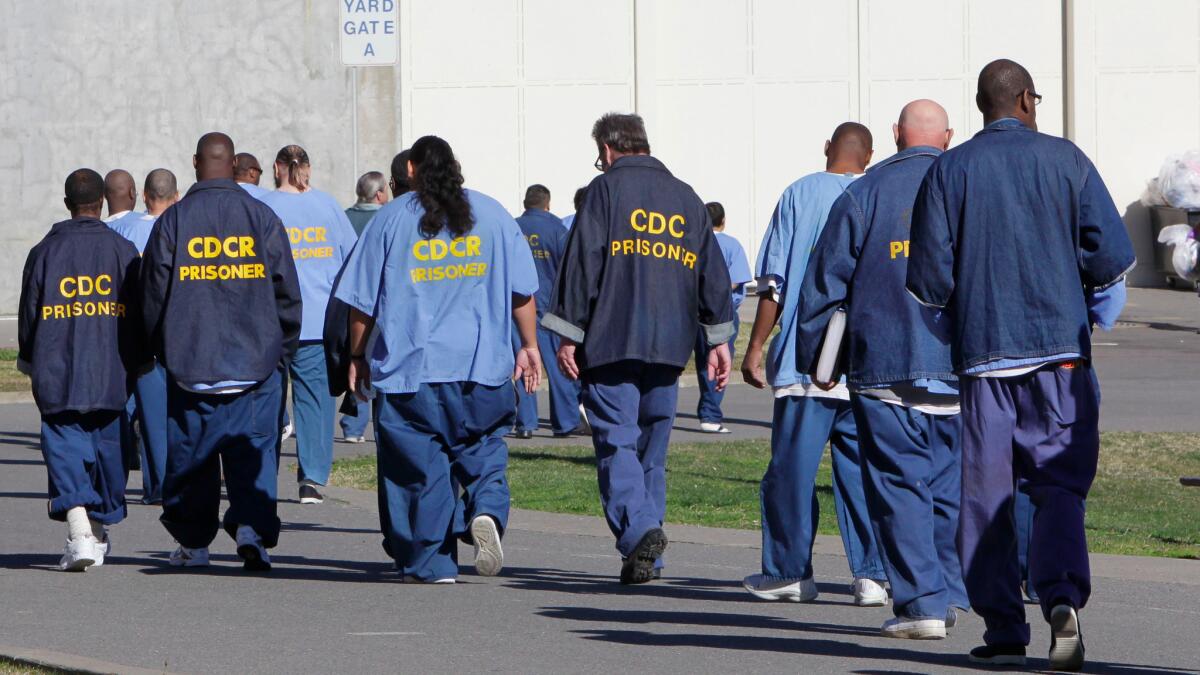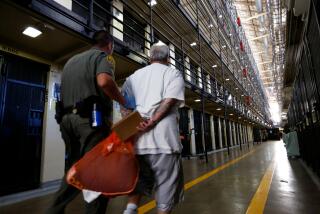Why Gov. Jerry Brown is staking so much on overhauling prison parole

Few California voters likely know much, if anything, about the state Board of Parole Hearings — from the qualifications of the 12 commissioners to their success in opening the prison gates for only those who can safely return to the streets.
And yet Gov. Jerry Brown’s sweeping overhaul of prison parole, Proposition 57, is squarely a question of whether those parole officials should be given additional latitude to offer early release to potentially thousands of prisoners over the next few years.
“I feel very strongly that this is the correct move,” Brown told The Times in a recent interview. “I’m just saying, let’s have a rational process.”
Prosecutors, though, contend the governor’s proposal goes too far after several years of trimming down California’s prison population to only the most hardened criminals. They believe the parole board, whose members are gubernatorial appointees, already is swinging too far away from being tough on crime.
“They are recommending release of people we never would have expected would have occurred so soon,” said Los Angeles County Dist. Atty. Jackie Lacey. “I’m concerned about people who really haven’t served a significant amount of time.”
In some ways, Proposition 57 is a proxy for a larger battle over prison sentences. There are sharp disagreements between Brown and many district attorneys over the legacy of California’s decadeslong push for new and longer mandatory sentences, a system in which flexibility is often limited to which crimes a prosecutor seeks to pursue in court. The warring sides have painted the Nov. 8 ballot measure in the starkest of terms, a choice for voters between redemption and real danger.
“We’re dealing with deep belief systems,” Brown said.
Proposition 57 would make three significant changes to the state’s criminal justice framework. It would require a judge’s approval before most juvenile defendants could be tried in an adult court — reversing a law approved by California voters in 2000. Critics believe prosecutors have wrongly moved too many juveniles into the adult legal system, missing chances for rehabilitation.
I’m just saying, let’s have a rational process.
— Gov. Jerry Brown on Proposition 57, his effort to revamp and expand prison parole
What’s most in dispute are two other Proposition 57 provisions, either of which could result in adult prisoners serving less time than their maximum sentences. Brown tacked those two provisions onto the juvenile justice measure in January. One would allow an expansion of good-behavior credits awarded by prison officials; the other gives new power to the state parole board to allow early release of prisoners whose primary sentences were not for “violent” crimes.
Read our ballot box guide to California’s 17 propositions »
In an interview last week, the governor argued that his ballot measure would add a dose of deliberative thought to a process too often driven by elected district attorneys playing to the white-hot politics of sensational crimes.
“Do you want the hurly burly of candidates, running for office, being the decision makers in the face of horrible headlines?” Brown asked. “Or would you rather have a quiet parole board, not now but 10 years later, deciding what’s right?”
The governor’s plan, which amends the state constitution, would only allow parole after a prisoner’s primary sentence had been served — applying only to the months or years tacked on for additional crimes or enhancements. And like the current system, a governor could override any parole board decision to release a prisoner.
Critics, though, think the parole board is already too eager to approve releases. Greg Totten, district attorney of Ventura County, said he believes parole board members are judged by how many prisoners they release.
“We don’t have confidence that the parole board will consider our concerns about public safety or the crime victims’ concerns,” Totten said. “Those hearings have become much more adversarial than they originally were.”
Totten and other prosecutors warn that an influx of new requests for early release would overload parole board commissioners and send too many cases to their deputy commissioners, state civil servants whose decisions are made outside of public hearings.
Prosecutors and Brown have sparred mightily over the assertion that Proposition 57 would only expand parole opportunities for “nonviolent” felons, a term used prominently in the ballot measure’s official title and summary.
In truth, the description only means that new parole opportunities wouldn’t apply to prisoners sentenced for one of 23 defined violent crimes in California’s penal code. That list includes crimes most voters would expect to see there, such as murder, sexual abuse of a child and kidnapping.
But in many ways, the list is porous. Not all rape crimes, for example, are designated as “violent.” Prosecutors insist prisoners serving time for as many as 125 serious and dangerous crimes would be eligible for parole under Brown’s ballot measure. Not surprisingly, the campaign opposing Proposition 57 is replete with images of felons who prosecutors allege could be released if the measure becomes law.
We don’t have confidence that the parole board will consider our concerns about public safety or the crime victims’ concerns.
— Ventura County Dist. Atty. Greg Totten, who opposes Proposition 57
But the governor insists prosecutors alleging Proposition 57 is too lenient are partly to blame for the “violent” crime list being so narrow. The list, he points out, was augmented by the same juvenile punishment ballot measure in 2000 that was backed by district attorneys.
“They created the damn violent list,” Brown said. “If they thought some crimes should have been violent and not just serious, tack it on. But they didn’t.”
Also in dispute is the impact of Proposition 57’s new good-behavior credits for prisoners. The proposal would give the California Department of Corrections and Rehabilitation expanded power to hand out credits that can reduce sentences, potentially to prisoners convicted of violent offenses. Reduced sentences mean less time in prison.
One new opponent to the ballot measure is Jaycee Dugard, the woman freed in 2009 after being held captive by a parolee and his wife for 18 years. Dugard, in a statement posted this week on Facebook, said she is “horrified at the thought” that one of her captors, Nancy Garrido, would ever be released from prison early. Garrido is serving a sentence of 36 years to life. A number of prominent law enforcement officers, including Los Angeles County Sheriff Jim McDonnell, also oppose Proposition 57.
Some prosecutors believe good-behavior credits would be given out too liberally, while the governor insists he would instruct prison officials to carefully use best practices from other states.
Brown, whose effort is supported by probation officers and leads in most every recent statewide public poll, suggests two overarching motivations. One is the specter of potential federal court-ordered prison releases, less likely now that massive prison overcrowding has abated after efforts to reduce penalties for less serious crimes and divert low-level offenders to county jails. Still, the governor insists that Proposition 57 is a more thoughtful way to reduce the prison population than what could some day be chosen by federal judges.
The other, to hear him tell it, is an effort to undo some of what he did in the 1970s in pushing California toward more fixed, inflexible sentences for a variety of crimes. Brown said he now believes that many convicted felons are best judged not at the time of sentencing, but once they have had a chance to change their lives.
“It allows flexibility,” the governor said. “I think this case is irrefutable to anyone with an open mind.”
Follow @johnmyers on Twitter, sign up for our daily Essential Politics newsletter and listen to the weekly California Politics Podcast
What you need to know about the 17 propositions on the Nov. 8 ballot
Gov. Brown signs laws to toughen punishment for rape in wake of Stanford case
California voters are being asked to force some new transparency in the Legislature
Track the latest in California politics
More to Read
Get the L.A. Times Politics newsletter
Deeply reported insights into legislation, politics and policy from Sacramento, Washington and beyond. In your inbox three times per week.
You may occasionally receive promotional content from the Los Angeles Times.







